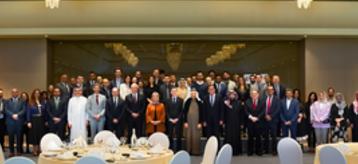$70bn project pipeline ‘a bright spot for economy’

MANAMA: Bahrain has five finalists competing in UAE-based business intelligence provider MEED’s annual awards programme.
MEED said it has shortlisted 80 companies and individuals in the region to qualify for its honours list in the projects market for their outstanding contributions to the growth of the region.
The finalists include Royal Bahrain Hospital (Healthcare Company of the Year), CTM360 (Technology Company of the Year) and Dr Sana Farid, co-founder and chief executive of Munfarid Consulting (Female Leader of the Year).
Bin Faqeeh Real Estate Investment Company was shortlisted in the Developer of the Year category while its chairman Faisal Faqeeh is vying for the Male Leader of the Year honour.
They will be competing not just for honours in various categories, but also for a stake in the billion dollars worth of projects in the pipeline across the kingdom.
“In putting the spotlight on the achievements of various stakeholders in the projects market in the GCC, we hope to highlight their invaluable inputs to the current growth and future sustainability of the region,” said MEED director of events John Emmerson.
According to the research firm, Bahrain’s $70bn project pipeline remains a bright spot for the country’s economy.
While the need for infrastructure has never diminished, the crash in oil prices from 2014 to 2016 has seen major changes to the market in the Middle East.
The value of contract awards has fallen by about $180bn a year in 2016 and 2017.
This reduced level of awards is set to continue in 2018 and 2019.
Despite this, the region still offers some of the best project opportunities in the world. The need for infrastructure and economic diversification is greater than ever.
“Anyone seeking to do business in the region must be both flexible and patient. The biggest projects will take time to come to the market, and contract awards may never recover to pre-2016 levels,” said MEED editorial director Richard Thompson.
“A new approach to project delivery is required. Governments want greater economic sustainability and are seeking innovation to improve efficiency and reduce the need for capacity expansions.
“Private developers are expected to take a larger share of the capital burden through public private partnerships (PPP), as well as through the privatisation of state utilities.
And future projects are expected to deliver more ‘in-country’ value in terms of job and supply chain opportunities for local companies,” Mr Thompson said.
Source: http://www.gdnonline.com/Details/426674


